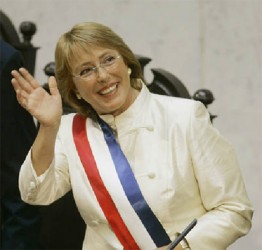SANTIAGO, Chile: This country, which has long been Latin America’s economic star, has seen its economic growth fall from 5 percent average in recent years to a projected 1.9 percent this year. But President Michelle Bachelet sounded pretty confident during an interview that things will get “somewhat better” in 2015, and much better in 2016.
Before we get into whether her optimism is justified, let’s review what she told me in a 40-minute interview at the presidential palace. A day earlier, a story in the Financial Times describing the country’s economic performance as “mediocre” made front page headlines in Chile.
Disputing criticism from the business community that her left-of-centre government has scared away domestic and foreign investments with its corporate tax increases to fund education reforms, Bachelet said Chile is not immune from the general slowdown affecting the world economy.
Most of Latin America has fallen into what the International Monetary Fund has described as “mediocre” growth rates, mainly because of external factors, Bachelet said. In Chile’s case, it has been mainly because it is a country that depends heavily on foreign trade, and has been especially affected by China’s economic slowdown.
 “In Chile, we are growing slower than we would like to, but this didn’t start during this government. It started at the end of 2012 and 2013,” she said.
“In Chile, we are growing slower than we would like to, but this didn’t start during this government. It started at the end of 2012 and 2013,” she said.
Asked how she hopes to get the economy back to 5 percent growth, Bachelet said her government is betting heavily on developing solar, wind and other non-conventional energy sources because Chile is one of the countries that pays the most for its energy.
In addition, Bachelet said that Chile is betting heavily on innovation, science and technology, and on getting small and medium companies to start exporting. Only 2 percent of Chile’s small and medium-sized companies are exporting, she added.
“By 2015, things will be somewhat better: we expect to grow by around 3 percent,” Bachelet said, adding that by 2016 the Chilean economy should grow “by about 5 percent.”
Later in the interview, I asked about her initial skepticism about the Pacific Alliance, the economic bloc of free-market countries consisting of Mexico, Colombia, Peru and Chile that was started by her predecessor, Sebastian Pinera.

“I will confess to you that, as I was living away from Chile and didn’t have much information, I was asking myself: ‘What is this Pacific Alliance?’ (and) ‘Is it a bluff?’ “ she said. But now, she added, “I am very enthusiastic about the Pacific Alliance. We are supporting it very strongly.”
She sidestepped a question about a recent statement by Bolivian President Evo Morales that the Pacific Alliance is a “lackey of (U.S.) imperialism.” Bachelet said that the group is a trade bloc, and that “it doesn’t pretend to be a political alliance.”
Toward the end of the interview, we talked about Venezuela. As a former political activist against the Chilean dictatorship, I asked how she felt about the Venezuelan government denying space for opponents to exercise their democratic freedom.
She conceded that Latin America’s UNASUR diplomatic bloc has not yet been successful in its mediation effort in Venezuela after the student protests that left at least 43 dead and hundreds injured earlier this year.
“If we haven’t seen the results we hoped for, it means that UNASUR must do much more,” she said.
My opinion: I tend to be optimistic about Chile, because, as I experienced it first-hand almost by chance, it continues to be a country of strong institutions.
While I was getting ready to be interviewed by Chile’s state-run TV network on my new book, I heard an opposition politician lashing out against Bachelet on air for what he was describing as her disastrous fiscal and education reforms.
To my even greater surprise, he was followed by another politician who was just as critical of Bachelet. It was a scene that would have been unthinkable on most of Latin America’s state-run TV networks.
Bachelet told me later, taking great care not to criticize any of her fellow Latin American leaders, that it wouldn’t cross her mind to censor the state TV network, or to use it to make hour-long speeches to the nation.
It may seem a trivial anecdote, but it speaks a lot about Chile. It remains a country of strong institutions, which is one of the reasons why it will probably recover, and do better than most of it neighbours.




